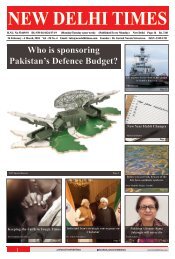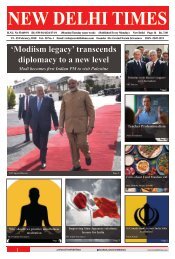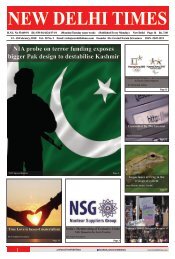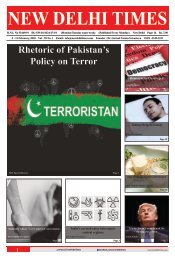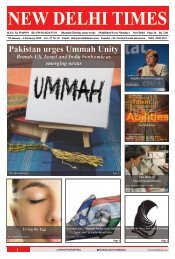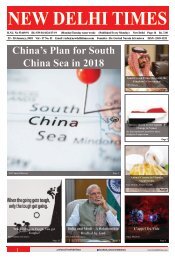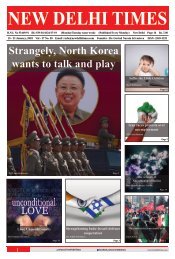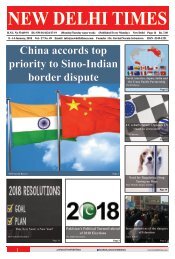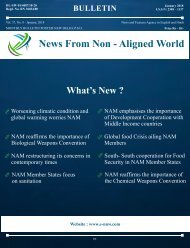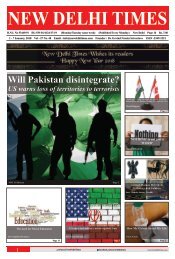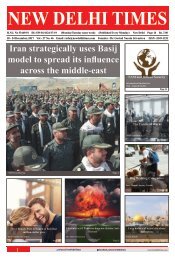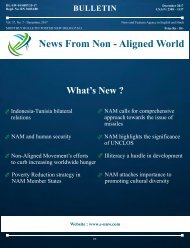10 february 2018_final
Create successful ePaper yourself
Turn your PDF publications into a flip-book with our unique Google optimized e-Paper software.
DL-SW-01/4087/18-20<br />
Regd. No. RN 36834/80<br />
BULLETIN<br />
February <strong>2018</strong><br />
I.S.S.N: 2348 – 1137<br />
Vol. 37, No. 9 - February, <strong>2018</strong><br />
MONTHLY BULLETIN POSTED NEW DELHI, P.S.O.<br />
News and Features Agency in English and Hindi<br />
Price Rs - <strong>10</strong>/-<br />
News From Non - Aligned World<br />
What’s New ?<br />
NAM encouraging Trade Flow<br />
among Members<br />
Vietnam-Egypt relations<br />
NAM Member States support<br />
Nagoya Protocol<br />
Non-Aligned Movement<br />
strengthening Multilateralism<br />
NAM Expresses concerns over<br />
Human Trafficking<br />
NAM supports Basel Convention<br />
on the Control of Trans boundary<br />
Movements of Hazardous Wastes<br />
and their Disposal<br />
Non-Aligned Movement striving<br />
for social development<br />
Mwalimu Nyerere’s legacy in the<br />
Non-Aligned Movement<br />
Website : www.e-nnw.com<br />
(1)
(2)
News From Non - Aligned World<br />
(3)
Vol. 37, No.9<br />
Month of Publishing - February, <strong>2018</strong><br />
I.S.S.N: 2348 – 1137<br />
Regd. No. RN 36834/80<br />
DL-SW-01/4087/18-20<br />
Dr.(Mrs.) Pramila Srivastava<br />
Dr. Ankit Srivastava<br />
Himanshu Sharma<br />
Sujay Dhawan<br />
Pawan Kumar<br />
- Editor-in-Chief<br />
- Editor<br />
- Deputy Director, Research<br />
- Director, Administration<br />
- Director, Development<br />
News From Non - Aligned World<br />
A-2/59, Safdarjung Enclave<br />
New Delhi - 1<strong>10</strong>029<br />
(India)<br />
Ph. No. : +91-11-26<strong>10</strong>2520<br />
Fax : +91- 11- 26196294<br />
E-mail<br />
Web<br />
: info@e-nnw.com<br />
: www.e-nnw.com<br />
Owner, Printer & Publisher<br />
Printed at<br />
Published at<br />
: Dr.(Mrs.)Pramila Srivastava<br />
: Sudhir Printers, 151, Desh Bandhu Gupta Market,<br />
Karol Bagh, New Delhi - 1<strong>10</strong>005<br />
: A-2/ 59, Safdarjung Enclave, New Delhi -1<strong>10</strong> 029 (INDIA)<br />
(4)
Index<br />
• NAM encouraging Trade Flow among Members Pg.08<br />
• Vietnam-Egypt relations Pg.09<br />
• NAM Member States support Nagoya Protocol Pg.<strong>10</strong><br />
• Non-Aligned Movement strengthening Multilateralism Pg.11<br />
• NAM Expresses concerns over Human Trafficking Pg.12<br />
• NAM supports Basel Convention on the Control of Pg.13<br />
Trans boundary Movements of Hazardous Wastes and<br />
their Disposal<br />
• Non-Aligned Movement striving for social development Pg.14<br />
• Mwalimu Nyerere’s legacy in the Non-Aligned Movement Pg.15<br />
(5)
(6)
From Editor’s Desk<br />
Non-Aligned Movement is most effective multilateral body<br />
which looks after the interests of the developing world in global<br />
political, economic, as well as environmental affairs. NAM<br />
has strived for multilateralism in the international order and<br />
has called for further strengthen coordination and mutual<br />
cooperation among Member states in global institutions such<br />
as the United Nations.<br />
NAM aims at promoting social and economic development<br />
among the Member States. The movement emphasizes that it<br />
is necessary for developing countries to work hand in hand<br />
to reach a target reform of global financial and economic<br />
governance and structural design in order to establish an evenhanded,<br />
clear and autonomous international system.<br />
The Movement has also supported global initiatives for<br />
the protection of the environment. Non-Aligned Movement<br />
recognizes the importance of Strengthening the conservation<br />
and sustainable use of biological diversity and in this regards has<br />
actively supported the implementation of the Nagoya Protocol.<br />
Another major environmental issue facing the developing world<br />
is the Trans boundary movement of hazardous wastes. NAM has<br />
called for States to act in accordance with the Basel Convention<br />
on the Control of Trans- Boundary Movements of Hazardous<br />
Wastes and their Disposal.<br />
Over the years, Non-Aligned Movement has produced great<br />
leaders who have effectively articulated the principles of the<br />
Movement not only in their respective country but beyond<br />
it also. This issue highlights the legacy of Tanzanian leader<br />
Mwalimu Nyerere in the Non-Aligned Movement.<br />
Dr. (Mrs.) Pramila Srivastava<br />
Editor - in - Chief<br />
(7)
News From Non -Aligned World<br />
NAM encouraging Trade Flow<br />
among Members<br />
By IINS Research Team<br />
One of the key reasons for the formation of the Non<br />
–Aligned Movement was to declare solidarity between<br />
nation states with a shared history of oppression and<br />
facing similar challenges of technological and economic<br />
development. The cold war which became the pretext of<br />
this new solidarity also influenced many political and<br />
cultural changes in many nation states.<br />
The need for NAM back then during Cold War ushered<br />
in with factions dividing the world into two grabbing<br />
for power creating a vacuum between US led West and<br />
Soviet Union leading the East turning other nations as<br />
mere pawns to their own game of power and authority<br />
on the global chessboard. However, NAM came into<br />
existence bringing a balanced outlook and catering<br />
and protecting also while strengthening the developing<br />
countries. But in the present where the relevance of<br />
NAM has been questioned again and again, Non-<br />
Aligned Movement has a very relevant and vital part to<br />
play with certain important issues facing the Southern<br />
countries on the globe.<br />
cooperation for industrial development, environment<br />
and sustainable development, human settlements,<br />
population, external debt, food and sustainable<br />
agricultural development, an Agenda for Development<br />
and renewal of the dialogue on strengthening<br />
international economic cooperation for development<br />
through partnership. NAM has urged the developing<br />
countries to review their development policies in view of<br />
“The Movement has not only sought a<br />
greater role in increasing the assertion of the<br />
developing world in the international order,<br />
but has also striven for active participation<br />
of its member state in international financial<br />
institutions, so as to ensure transparency<br />
and bridge the divide between the global<br />
North and the Global South. One of the major<br />
contributions of the Non–Aligned Movement<br />
towards this objective is the conceptualizing of<br />
the New Economic International Order (NEIO)”<br />
The Movement has not only sought a greater role in<br />
increasing the assertion of the developing world in<br />
the international order, but has also striven for active<br />
participation of its member state in international<br />
financial institutions, so as to ensure transparency<br />
and bridge the divide between the global North and<br />
the Global South. One of the major contributions of<br />
the Non–Aligned Movement towards this objective is<br />
the conceptualizing of the New Economic International<br />
Order (NEIO).<br />
Developing countries have lost their growth due to<br />
asymmetric global economic order. They have lagged due<br />
to technology deficiency, exploitation of their resources<br />
by developed countries and ever increasing debt<br />
burdens .They have fallen under dependency in under<br />
the unequal impact of globalization. Born out of the<br />
African-Asian Solidarity Conference held in Bandung,<br />
Indonesia, in 1955, the Non-Aligned Movement<br />
(NAM), created officially in Belgrade in 1961, allowed<br />
the Third World Countries to affirm an autonomous<br />
political existence and call for more equitable economic<br />
exchanges between North and South. NAM has cosponsored<br />
a number of resolutions presented by the<br />
Group of 77 on issues such as trade and development,<br />
the global economic situation. This involves issues like<br />
how the global south can rely less on exports to the West<br />
and rely more on domestic and regional demand and<br />
on South-South trade and investment, and promote a<br />
strong role of the state in economic policies, along with<br />
devising appropriate policies for industry, agriculture<br />
and services, including financial policy in developing<br />
countries. NAM has urged the need for South-South<br />
coordination and cooperation. As North-South relations<br />
go through difficult or tumultuous times, South-South<br />
solidarity and action is even more urgent. NAM has a<br />
critical role to play in this.<br />
From its inception, the idea of South-South cooperation<br />
was very much based on a model of solidarity among<br />
developing countries and collective self-reliance<br />
through various co-operation agreements to address<br />
common development challenges. The emergence of a<br />
number of large developing countries as major players<br />
on the international stage has brought the question of<br />
South-South co-operation to centre-stage once again.<br />
South-South ties, be it economic or political, are more<br />
Contd.....On Page 16<br />
February, <strong>2018</strong><br />
(8)
Vietnam-Egypt relations<br />
By Dr. Ankit Srivastava, Editor<br />
Vietnam and Egypt will celebrate the 55th anniversary<br />
of the diplomatic relations between the two countries<br />
this year. The foreign policy of the two countries is based<br />
upon the principles of the Non-Aligned Movement. The<br />
traditional friendly and cooperative relations between<br />
Vietnam and Egypt have progressed smoothly. Egypt<br />
was one of the first Arab countries to establish relations<br />
with Vietnam. Vietnam has had its trade representative<br />
office in Egypt since 1958 and on September 1, 1963,<br />
the two countries formally established diplomatic ties.<br />
Relations between the two countries were further<br />
boosted by the visit of Egyptian President Abdel Fattah<br />
el-Sisi in Hanoi in September 2017 which bore fruitful<br />
results. During Abdel Fattah el-Sisi’s visit to Vietnam,<br />
both the countries expressed their pleasure over their<br />
sound affiliation at regional and international forums,<br />
including mutual support for each other when running<br />
for seats in United Nations agencies. The two nations<br />
regularly work together and support each other at<br />
international forums, with Egypt backing Vietnam’s<br />
application for the UN Security Council (2020 - 2021)<br />
and the UN Human Rights Council (2014 - 2016), and<br />
Vietnam backing Egypt’s admission to the UN Security<br />
Council (2016 - 2017) and the UN Human Rights<br />
Council (2017 - 2019).<br />
Vietnam President Tran Dai Quang said that his<br />
country valued Egypt’s role as a founding member of<br />
the Non-aligned Movement and its place in outlining the<br />
Movement’s basic principles on independence, national<br />
sovereignty and cooperation for mutual benefit and<br />
peace among nations. Quang emphasised that these<br />
principles uphold their value today and still serve as the<br />
guideline for the traditional friendship between Vietnam<br />
and Egypt. Quang expressed his belief that with the<br />
resolve of both sides’ leaders, the bi-lateral cooperation<br />
will continue to develop in a substantial manner,<br />
meeting the aspiration and interests of the people of<br />
the two countries and contributing to maintaining<br />
peace, stability, cooperation and development in each<br />
region and the world as a whole.<br />
Egypt and Vietnam have a robust trade relationship.<br />
Egypt is Vietnam’s second largest trade partner in<br />
Africa, with two-way trade revenues between them<br />
reaching US$316 million in 2016. Vietnam’s major<br />
exports to Egypt include seafood, automotive parts,<br />
fabrics, black pepper, coffee, rubber and consumer<br />
News From Non -Aligned World<br />
goods, while its main imports are chemicals, honey,<br />
petroleum products, milk and dairy products, fibers<br />
and consumer goods. Egypt was the first Northern<br />
African country to recognise Vietnam as a country with<br />
a full market economy in November 2013.<br />
“Vietnam President Tran Dai Quang said that<br />
his country valued Egypt’s role as a founding<br />
member of the Non-aligned Movement and its<br />
place in outlining the Movement’s basic principles<br />
on independence, national sovereignty and<br />
cooperation for mutual benefit and peace among<br />
nations. Quang emphasised that these principles<br />
uphold their value today and still serve as the<br />
guideline for the traditional friendship between<br />
Vietnam and Egypt.”<br />
The two countries decided to bolster bilateral<br />
cooperation in trade and investment, and agreed upon<br />
to create optimal conditions for businesses in order to<br />
access the respective markets, aiming to raise two-way<br />
trade to US$1 billion in the future. Sisi emphasised<br />
that Egypt serves as a gateway for Vietnam to enter<br />
the African and Middle East markets, and added that<br />
Egypt’s engagement in free trade agreements with<br />
Africa, Gulf States and Europe would make it easier<br />
for Vietnamese goods to access these markets. Sisi<br />
further stressed t that Egypt wishes to balance trade<br />
with Vietnam and called on the Vietnamese enterprises<br />
to invest in Egypt’s industrial parks.<br />
On the side-lines of Sisi’s visit, Egypt’s Minister of<br />
Investment and International Cooperation Sahar<br />
Nasr and Chairman of the Suez Canal Authority<br />
and the Suez Canal Economic Zone (SCZone) Vice-<br />
Admiral Mohab Mamish met Vietnamese Minister<br />
of Planning and Investment Nguyen Chi Dung. Nasr<br />
emphasised the importance of enhancing investment<br />
cooperation between both countries and encouraging<br />
the establishment of joint ventures between the private<br />
sectors in Egypt and Vietnam. Both sides agreed<br />
to sign a Memorandum of Understanding (MOU) in<br />
investment and the stock exchange, and have also held<br />
the Egyptian-Vietnamese Business Council.<br />
Contd.....On Page 16<br />
(9)<br />
February, <strong>2018</strong>
News From Non -Aligned World<br />
NAM Member States support<br />
Nagoya Protocol<br />
By IINS Research Team<br />
The Nagoya Protocol on Access to Genetic Resources<br />
and the Fair and Equitable Sharing of Benefits Arising<br />
from their Utilization (ABS) to the Convention on<br />
Biological Diversity is a supplementary agreement to<br />
the Convention on Biological Diversity (CBD).<br />
It provides a transparent legal framework for the<br />
effective implementation of one of the three objectives<br />
of the CBD: the fair and equitable sharing of benefits<br />
arising out of the utilization of genetic resources. The<br />
Nagoya Protocol on ABS was adopted on 29 October<br />
20<strong>10</strong> in Nagoya, Japan and entered into force on 12<br />
October 2014, 90 days after the deposit of the fiftieth<br />
instrument of ratification. Its objective is the fair and<br />
equitable sharing of benefits arising from the utilization<br />
of genetic resources, thereby contributing to the<br />
conservation and sustainable use of biodiversity.<br />
The objective of the Nagoya Protocol is addressed in<br />
Article 1. The text of this provision draws from the third<br />
objective of the CBD as stated in its own Article 1, and<br />
it refers to “the fair and equitable sharing of the benefits<br />
and to the transferred technologies have to be taken<br />
into account. Finally, it is highlighted that the Nagoya<br />
Protocol aims at contributing to the conservation of<br />
biodiversity and the sustainable use of its components.<br />
Non-Aligned Movement recognizes the importance of<br />
Strengthening the conservation and sustainable use of<br />
biological diversity and the fair and just international<br />
regime on access and benefit sharing that respect the<br />
sovereign rights, of States over their natural resources<br />
and promotes the fair and equitable benefit sharing<br />
from the utilization of genetic resources and associated<br />
traditional and local knowledge in the framework of<br />
the Convention on Biological Diversity and welcomed<br />
the coming into force of the Nagoya Protocol on 12<br />
October 2014. The Movement has encouraged the<br />
respective parties, in close collaboration with relevant<br />
stakeholders, to take concrete measures towards<br />
achieving the objectives of the Convention on Biological<br />
Diversity and the Nagoya Protocol, and in this regard<br />
emphasizes the need to comprehensively address<br />
at all levels the difficulties that impede their full<br />
implementation.<br />
“Non-Aligned Movement recognizes the<br />
importance of Strengthening the conservation<br />
and sustainable use of biological diversity and<br />
the fair and just international regime on access<br />
and benefit sharing that respect the sovereign<br />
rights, of States over their natural resources and<br />
promotes the fair and equitable benefit sharing<br />
from the utilization of genetic resources and<br />
associated traditional and local knowledge in<br />
the framework of the Convention on Biological<br />
Diversity and welcomed the coming into force of<br />
the Nagoya Protocol on 12 October 2014”<br />
arising from the utilization of genetic resources” as the<br />
main goal of the Protocol. Article 1 clarifies that such<br />
benefit-sharing includes appropriate access to genetic<br />
resources, appropriate transfer of relevant technologies,<br />
and appropriate funding. Accordingly, benefit-sharing<br />
entails more than sharing a certain percentage of the<br />
profits when a product is developed on the basis of a<br />
genetic resource. Furthermore, it is re-stated that when<br />
sharing benefits, the rights over the accessed resources<br />
NAM Member States have actively supported the<br />
implementation of the Nagoya Protocol. A few examples<br />
of such states are mentioned here. Nepal has ratified<br />
the Nagoya Protocol Access to Genetic Resources and<br />
the Fair and Equitable Sharing of Benefits Arising from<br />
their Utilization (ABS) to the Convention on Biological<br />
Diversity. The endorsement of the protocol is expected<br />
to help Nepal establish its rights over genetic resources<br />
produced from Nepal. It will also help protect biodiversity<br />
and increase the access of the local community<br />
to natural resources, and the ability to forge agreements<br />
on sharing of benefits.<br />
South Africa ratified the Nagoya Protocol on <strong>10</strong> January,<br />
2013. South Africa is one of the first countries to<br />
regulate the protection and use of indigenous biological<br />
resources and associated traditional knowledge. In<br />
April 2008, regulations for bio-prospecting, access and<br />
benefit sharing came into effect to manage access to<br />
South Africa’s bio-resources.<br />
India ratified the Nagoya Protocol on 4 October<br />
Contd.....On Page 16<br />
February, <strong>2018</strong><br />
(<strong>10</strong>)
Non-Aligned Movement strengthening<br />
Multilateralism<br />
By IINS Research Team<br />
NAM was initiated to sustain peace within the developing<br />
nations but it also aimed at gaining economic stability<br />
and sufficiency in the member nations. During the years<br />
the focus of Non-Aligned Summits therefore shifted<br />
away from essentially politically issues, to the advocacy<br />
of solutions to global economic and other problems.<br />
Later submits of NAM were all the more concentrated<br />
on conducive policies for economic development<br />
utilizing and strengthening South-South cooperation.<br />
The Summit of Jakarta in 1992 was a turning point<br />
in Non-Aligned history since this was the first Summit<br />
after the end of the Cold War. It allowed the Movement<br />
to shift its focus in a direction that also enabled it to<br />
work across to groupings such as the G-7 and the EU.<br />
The founders of the Non-Aligned Movement and their<br />
successors recognised that the Movement would<br />
probably be destroyed if they created such formal<br />
structures for the Movement as a constitution and<br />
“The practice of the Movement is to make all<br />
decisions by consensus. Consensus has enhanced<br />
the solidarity and unity of the Movement. This<br />
concept presupposes understanding of and respect<br />
for different points of view, including disagreement<br />
and implies mutual accommodation on the basis of<br />
which agreement can emerge by a sincere process<br />
of adjustment among member nations in the true<br />
spirit of Non-Alignment”<br />
News From Non -Aligned World<br />
the same time also delegated certain responsibilities for<br />
promoting the principles and activities of the Movement.<br />
The Coordinating Bureau is the vocal point for<br />
coordination. The Bureau reviews and facilitates<br />
the harmonisation of the work of the NAM Working<br />
Groups, Contact Groups, Task Forces and Committees.<br />
The Heads of State or Government entrusted the<br />
Coordinating Bureau with the task of intensifying its<br />
actions to further strengthen coordination and mutual<br />
cooperation among Non-Aligned countries, including<br />
unified action in the United Nations and other<br />
international foray on issues of common concern. All<br />
NAM Working Groups, Contact Groups, Task Forces<br />
and Committees meet as often as necessary. In the<br />
fulfillment of their mandates due regard is paid to<br />
coordination, efficiency and preparedness.<br />
It is necessary that the NAM countries elected to the<br />
Security Council, and who form the NAM Caucus in<br />
the Security Council, constantly strive to adopt unified<br />
positions, and that the decisions and the positions of NAM<br />
as adopted at its Summits and Ministerial Conferences<br />
and by the Coordinating Bureau be properly reflected<br />
by them in the Security Council, without prejudice to<br />
their sovereign rights. In order to promote coordination<br />
and cooperation between the NAM and the Group of 77<br />
in promoting the interests of developing countries in<br />
international forum, a Joint Coordinating Committee of<br />
the two groups was established in 1994, which meets<br />
regularly in New York.<br />
internal secretariat. A multilateral trans-national<br />
organisation made up of states with differing<br />
ideologies and purposes could never create a rational<br />
administrative structure to implement its policies that<br />
all could accept.<br />
The Non-Aligned Movement has created a unique form<br />
of administrative style. Non-Aligned administration is<br />
non-hierarchical, rotational and inclusive, providing<br />
all member states, regardless of size and importance,<br />
with an opportunity to participate in global decisionmaking<br />
and world politics. The Summit is the occasion<br />
when the Movement formally rotates its Chair to the<br />
Head of State of the host country of the Summit, who<br />
then holds office until the next Summit. The Chair is at<br />
The practice of the Movement is to make all decisions<br />
by consensus. Consensus has enhanced the solidarity<br />
and unity of the Movement. This concept presupposes<br />
understanding of and respect for different points of<br />
view, including disagreement and implies mutual<br />
accommodation on the basis of which agreement can<br />
emerge by a sincere process of adjustment among<br />
member nations in the true spirit of Non-Alignment.<br />
The Cartagena Document on Methodology states that<br />
consensus, while signifying substantial agreement,<br />
does not require implying unanimity. In sensitive<br />
issues, the NAM tradition is to pay attention to<br />
openness and the holding of extensive consultations<br />
with the broadest possible participation. The Bureau<br />
of the Meeting, with its representative capacity, should<br />
render its assistance.<br />
(11)<br />
February, <strong>2018</strong>
News From Non -Aligned World<br />
NAM Expresses concerns over<br />
Human Trafficking<br />
By IINS Research Team<br />
Human trafficking has become a serious transnational<br />
threat, threatening the security of not only the individual<br />
victims but entire communities as well. Article 3,<br />
paragraph (a) of the Protocol to Prevent, Suppress and<br />
Punish Trafficking in Persons of the United Nations<br />
Office on Drugs and Crime (UNODOC) defines Trafficking<br />
in Persons as the recruitment, transportation, transfer,<br />
harbouring or receipt of persons, by means of the threat<br />
or use of force or other forms of coercion, of abduction,<br />
of fraud, of deception, of the abuse of power or of a<br />
position of vulnerability or of the giving or receiving of<br />
payments or benefits to achieve the consent of a person<br />
having control over another person, for the purpose of<br />
exploitation. Exploitation shall include, at a minimum,<br />
the exploitation of the prostitution of others or other<br />
forms of sexual exploitation, forced labour or services,<br />
slavery or practices similar to slavery, servitude or the<br />
removal of organs.<br />
The most common victims of human trafficking<br />
are women and children from poor, rural areas in<br />
developing countries. Non-Aligned Movement, which<br />
is the largest collective voice of the developing nations<br />
of the world, has expressed serious concerns over the<br />
issue of human trafficking.<br />
NAM has recognised that trafficking in persons and<br />
smuggling of migrants continue to pose a serious<br />
challenge to humanity and require concerted<br />
international response, based on cooperation and<br />
sharing of information, as appropriate. The Heads<br />
of State or Government of NAM Member States have<br />
also recognized the importance of cooperation and<br />
responsibility sharing among countries of origin,<br />
transit, and destination in addressing the problem<br />
of smuggling of migrants, as appropriate; and to that<br />
end, urged all States to devise, enforce and strengthen<br />
effective measures to prevent, combat and eliminate all<br />
forms of trafficking in persons to counter the demand<br />
for trafficked victims and to protect the victims, in<br />
particular women and children subjected to forced<br />
labour, or sexual or commercial exploitation, violence<br />
and sexual abuse.<br />
NAM Member States have undertaken a series of<br />
measures to combat the threat of human trafficking. A<br />
few initiatives are mentioned below.<br />
In South Asia, Bangladesh has a comprehensive law on<br />
TIP and a National Plan of Action to address all aspects of<br />
TIP and Cross Border Trafficking (CBT). The government<br />
has prioritized the training and sensitization of public<br />
prosecutors and law enforcement. A government-led<br />
Central Trafficking Committee is also in place with<br />
inter-ministerial presence and participation. India has<br />
implemented International Conventions on Trafficking.<br />
India has ratified the United Nations Convention on<br />
Transnational Organised Crime (UNCTOC) which has<br />
as one of its Protocols Prevention, Suppression and<br />
Punishment of Trafficking in Persons, particularly<br />
Women and Children. For dealing with cross border<br />
trafficking and to address the various issues relating<br />
to prevention of Trafficking, victim identification and<br />
repatriation and make the process speedy and victimfriendly<br />
between India and Bangladesh, a Task Force of<br />
India and Bangladesh has been constituted.<br />
In North Africa, Algeria is a transit and destination<br />
country for thousands of men, women and children<br />
originating from sub-Saharan African countries and<br />
wishing to reach Europe or the Middle East. . Algeria<br />
prohibits all forms of trafficking under Section 5 of<br />
its criminal code, enacted in March 2009. Prescribed<br />
penalties under this statute range from three to <strong>10</strong><br />
years’ imprisonment.<br />
Another Northern African country Morocco has<br />
demonstrated increasing efforts by enacting a new<br />
anti-trafficking law prohibiting all forms of trafficking<br />
and establishing an inter-ministerial anti-trafficking<br />
commission. It also worked to reduce vulnerability<br />
to trafficking by enacting a new law limiting child<br />
domestic work and by extending legal protections and<br />
social services to irregular migrants.<br />
Morocco has cracked down on human trafficking and<br />
illegal immigrants to the country by dismantling 80<br />
human trafficking networks and foiling 50,000 illegal<br />
immigration attempts in 2017.<br />
NAM Member States are actively engaged in combating<br />
the menace of human trafficking through devising<br />
effective anti-trafficking strategies and also through<br />
cooperation with the Border States.<br />
February, <strong>2018</strong><br />
(12)
NAM supports Basel Convention on the<br />
Control of Trans boundary Movements of<br />
Hazardous Wastes and their Disposal<br />
Non-Aligned Movement has regularly expressed<br />
its concerns over the environmental issues that<br />
adversely affect the international community and<br />
the developing world in particular. One such issue is<br />
the trans- boundary movement of hazardous wastes.<br />
International, regional, and national rules and laws<br />
have been drafted, amended, and adopted on the issue<br />
of trans-boundary movement of hazardous waste. The<br />
priority has been placed on waste minimization and<br />
waste disposal at source. NAM has called for States<br />
to act in accordance with the Basel Convention on the<br />
Control of Trans- boundary Movements of Hazardous<br />
Wastes and their Disposal.<br />
The Basel Convention on the Control of Trans- boundary<br />
Movements of Hazardous Wastes and their Disposal<br />
was adopted on 22 March 1989 by the Conference of<br />
Plenipotentiaries in Basel, Switzerland, in response to<br />
a public outcry following the discovery, in the 1980s, in<br />
Africa and other parts of the developing world of deposits<br />
of toxic wastes imported from abroad. The overarching<br />
objective of the Basel Convention is to protect human<br />
health and the environment against the adverse effects<br />
of hazardous wastes. Its scope of application covers a<br />
wide range of wastes defined as “hazardous wastes”<br />
based on their origin and/or composition and their<br />
characteristics, as well as two types of wastes defined<br />
as “other wastes” - household waste and incinerator<br />
ash.<br />
The provisions of the Convention centre around the<br />
following principal aims: 1) the reduction of hazardous<br />
waste generation and the promotion of environmentally<br />
sound management of hazardous wastes, wherever<br />
the place of disposal; 2) the restriction of trans<br />
boundary movements of hazardous wastes except<br />
where it is perceived to be in accordance with the<br />
principles of environmentally sound management;<br />
and 3) a regulatory system applying to cases where<br />
trans boundary movements are permissible. The key<br />
discussion in Basel Convention is environmentally<br />
sound management. Environmentally sound management<br />
was adopted in 1994. The environmentally sound<br />
management of hazardous wastes has placed<br />
responsibilities on the operator of the facility that must<br />
News From Non -Aligned World<br />
By IINS Research Team<br />
be practiced to comply with the local regulation. On the<br />
other hand, the environmentally sound management is<br />
aim to harmonize the need to comply the regulation<br />
and the technology that available to treat the waste at<br />
the reasonable cost. On top of that, environmentally<br />
sound management also set the hierarchy of waste<br />
management, which first emphasized the waste<br />
avoidance or waste minimization then recovery, reuse,<br />
recycling and <strong>final</strong>ly disposal<br />
NAM Member States have been taking steps for<br />
the effective management of hazardous wastes and<br />
meeting the obligations of the Basel Agreement.<br />
India ratified the Basel convention on 24 June 1992.<br />
India has been taking measures for the effective<br />
“One such issue is the trans- boundary movement<br />
of hazardous wastes. International, regional,<br />
and national rules and laws have been drafted,<br />
amended, and adopted on the issue of transboundary<br />
movement of hazardous waste. The priority<br />
has been placed on waste minimization and waste<br />
disposal at source. NAM has called for States to<br />
act in accordance with the Basel Convention on the<br />
Control of Trans- boundary Movements of Hazardous<br />
Wastes and their Disposal”<br />
management of hazardous wastes and thereby meeting<br />
the obligations of the Basel Convention. The Hazardous<br />
and Other Wastes (Management & Trans boundary<br />
Movement) Rules, 2016 was notified to ensure the safe<br />
handling, processing, treatment, storage, collection,<br />
transportation, collection, and disposal of hazardous<br />
waste.<br />
Another NAM Member State Zimbabwe is a signatory<br />
to the Basel Convention. The transit and movement of<br />
hazardous substances and hazardous waste into and<br />
through Zimbabwe is governed by the Environmental<br />
Management Act.<br />
Malaysia became a party to the Basel Convention in<br />
October 1993. To control the illegal trans boundary<br />
Contd.....On Page 16<br />
(13)<br />
February, <strong>2018</strong>
News From Non -Aligned World<br />
Non-Aligned Movement striving for<br />
social development<br />
By IINS Research Team<br />
The Non-Aligned Movement (NAM) came into existence<br />
during the first conference of Heads of State of nonaligned<br />
countries that took place in Belgrade in<br />
September 1961. Representing newly-independent<br />
developing countries, the movement and its policies<br />
can be directly linked to the decolonisation process<br />
with the initial years of political engagement in world<br />
affairs characterised by anti-imperialist slogans and<br />
the denunciation of colonialism, apartheid and racism.<br />
The movement since its inception has always believed in<br />
promoting the rule of law and respect for it at all levels<br />
which will ensure the maintenance of international peace<br />
and security, achieving socioeconomic development. The<br />
movement emphasizes that it is necessary for developing<br />
countries to work hand in hand to reach a target reform<br />
of global financial and economic governance and<br />
structural design in order to establish an even-handed,<br />
clear and autonomous international system.<br />
The aspirations of this type need sustained economic<br />
growth in developing countries to achieve their aims<br />
which are essentially eradication of poverty, food,<br />
health, education, employment, housing and social<br />
integration.<br />
The members of the Non-Aligned movement committed<br />
themselves to these goals in the Copenhagen summit.<br />
The Cartagena summit was marked by affirmation<br />
towards the achievement of these goals, inclusion of<br />
effective international cooperation was also included<br />
in the proclamation. The leaders of various states<br />
also recalled the commitment by the world leaders<br />
during the World Social Summit that the eradication<br />
of poverty requires decisive national and international<br />
cooperation.<br />
The eradication of poverty more than its ethical dilemma<br />
for a nation is a social and economic imperative and<br />
can only be achieved through a multi-dimensional<br />
approach which combines programs targeted to<br />
meet the basic needs of all and ensure access of all<br />
opportunities, resources and protection of everyone.<br />
Nationally governments need to substantially increase<br />
public expenditure for social development, developed<br />
countries and international organizations need to<br />
assist in providing both the required financial and<br />
technological resources. The leaders stressed that such<br />
an investment would underline solidarity and increase<br />
equity, productivity and welfare.<br />
Community services need to ensure full participation<br />
in social sector, the leaders promised to tackle these<br />
problems with modern services which increases wider<br />
coverage and ensures a better quality of resources.<br />
Social development is the first step towards progress,<br />
which ensure better conditions of equity, economic<br />
productivity, social solidarity and political participation,<br />
the greatest priority shall still be given to the more<br />
vulnerable social strata and to the least developed<br />
countries.<br />
These goals if achieved would lead to better employment<br />
opportunities, the social strategy should further<br />
emphasize the development of human resources<br />
in order to take full advantage of opportunities. The<br />
leaders reiterated that education should be one<br />
of the foundations to achieve social and economic<br />
development. The leaders also declared that such<br />
development policies should incorporate social security<br />
systems which include health services and improving<br />
the efficiency of social security programs for the most<br />
vulnerable group. A healthy habitat is indispensable<br />
for the improvement of the standard of living of each<br />
member states population. There should be adequate<br />
public services, disaster prevention and response<br />
mechanisms.<br />
The heads of various governments renewed their<br />
commitment to promote social integration and attain<br />
economic stability, ensure the promotion of justice and<br />
defense of all human rights and the propagation of<br />
values of democracy and the spirit of solidarity. It was<br />
further called on all states to endorse the principles<br />
of United Nations and following its guidelines urged<br />
nations to define terrorism and to differentiate it from<br />
the struggle for national liberation and to ensure<br />
effective measures for concerted action .<br />
The sanctity of freedom of speech and the right to selfdetermination.<br />
In this context it was also stressed that<br />
movements of people struggling against colonial or alien<br />
domination and foreign occupation did not constitute<br />
terrorism.<br />
February, <strong>2018</strong><br />
(14)
Mwalimu Nyerere’s legacy in the Non-<br />
Aligned Movement<br />
By Dr. Pawan Mathur<br />
Mwalimu Julius Kambarage Nyerere (1922–1999),<br />
the first president of the United Republic of Tanzania<br />
(1964–1985) was a prominent figure in Non-Aligned<br />
Movement. Nyerere embraced NAM as a symbol of<br />
Third World Unity. Nyerere supported the principles<br />
of the NAM on detente, disarmament, development,<br />
anti-colonialism and the struggle for a reshaping of the<br />
international economic order.<br />
Nyerere called for an active involvement in world politics<br />
to achieve the principles enshrined in the Non-Aligned<br />
Movement. At the Sixth Conference of Heads of State or<br />
Government of Non-Aligned Countries held in Havana,<br />
Cuba in 1979, Nyerere remarked that “the Non-Aligned<br />
Conference is not an organization of neutrals bound<br />
to some kind of neutrality in international arguments.<br />
On the contrary, we have positive policy commitments<br />
of our own. First we are a group of States committed<br />
to fight against imperialism in all its forms. The Non-<br />
Aligned States are, by definition, anti-colonialist and<br />
anti-imperialist, and we are committed to the struggle<br />
against those forces”.<br />
Nyerere develop the philosophical basis of African<br />
socialism in what he referred to as Ujamaa. When<br />
Tanzania became a republic and he was elected<br />
president in 1962, he pointed out that in the new<br />
society under construction, development must be<br />
human-centered and closely linked to freedom: ‘For<br />
the truth is that development means development of<br />
the people. Development brings freedom, provided it is<br />
development of the people”.<br />
In January 1967, President Nyerere presented to the<br />
Tanzania African National Union (TANU), the country’s<br />
ruling party, a program to be implemented throughout<br />
Tanzanian society as the basis of a socialist policy. This<br />
program, which TANU adopted, became known as the<br />
Arusha Declaration.<br />
The Declaration emphasized the following key policies<br />
of socialism and self-reliance: (1) the need to build a<br />
society where no person exploits another, everybody<br />
works and reaps a fair return for their labour; all major<br />
means of production and exchange in the nation are<br />
controlled and owned wholly or in part by the peasants<br />
through their democratically elected government<br />
News From Non -Aligned World<br />
and cooperatives; (2) the need to de-emphasize the<br />
importance of money and industries as starting points<br />
of development; and (3) The need to de-emphasize<br />
urban development and focus on rural development.<br />
The Arusha Declaration was one of the most important<br />
statements of principle in relation to the development<br />
problems facing the developing world.<br />
Nyerere furthered his principles in what he referred<br />
as the Economic South. Nyerere was nominated to<br />
chair the South Commission at the NAM meeting in<br />
1986. He recognized the need to strengthen South-<br />
South cooperation in international affairs. In 1987 the<br />
South Commission was formally established under expresident<br />
Nyerere’s chairmanship and subsequently<br />
produced its report The Challenge to the South in 1990<br />
which called for greater South-South cooperation. He<br />
chaired the South Commission from 1987 to 1989,<br />
when it became the South Centre.<br />
Nyerere reiterated his commitment towards establishing<br />
South-South cooperation at various international<br />
forums. At the Opening Ceremony of the Second<br />
Meeting of the Council of Representatives at the U.N.<br />
Trusteeship Council in New York on the 21st September<br />
“Nyerere called for an active involvement in world<br />
politics to achieve the principles enshrined in the<br />
Non-Aligned Movement. At the Sixth Conference<br />
of Heads of State or Government of Non-Aligned<br />
Countries held in Havana, Cuba in 1979, Nyerere<br />
remarked that “the Non-Aligned Conference is not<br />
an organization of neutrals bound to some kind<br />
of neutrality in international arguments. On the<br />
contrary, we have positive policy commitments<br />
of our own. First we are a group of States<br />
committed to fight against imperialism in all its<br />
forms. The Non- Aligned States are, by definition,<br />
anti-colonialist and anti-imperialist, and we are<br />
committed to the struggle against those forces”<br />
1998, he stated that “If we in the developing countries<br />
arc to shape our own destiny, and participate fully<br />
in shaping the future and the nature of the world in<br />
which we live in, we have to have an effective voice. But<br />
we will not have that effective voice if we do not work<br />
(15)<br />
February, <strong>2018</strong>
News From Non -Aligned World<br />
together, at least in some areas of vital concern to all of<br />
us. Together we can reduce our separate weaknesses.<br />
Acting together we can become stronger; we can gain<br />
at, least some more influence In the world”<br />
Nyerere’s total commitment to global equality,<br />
solidarity, and eradication of poverty made him one of<br />
the most respected, persistent, and principled voices<br />
for the underdeveloped world at the Non-Aligned<br />
Movement and the South Commission. In recognition<br />
of his exceptional contribution to global justice and<br />
equality for over three decades, for example, Nyerere<br />
was unanimously elected the first chair of the South<br />
Commission He also earned the Nehru Award for<br />
International Understanding in 1976.<br />
In 1982, he was awarded the Third World Prize by the<br />
Indian Prime Minister, Indira Gandhi.<br />
In 1985, he received the Beyond War Award for his<br />
distinguished service to humanity. In 1987, he was<br />
recognized with Lenin Peace Prize (erstwhile Soviet<br />
Union’s equivalent of Nobel Peace Prize) for his tireless<br />
efforts to build a just and peaceful world.<br />
NAM encouraging Trade Flow......<br />
important now than they have ever been. But within the<br />
broader concept of South-South co-operation, there is<br />
also a specific development co-operation dimension. It<br />
typically combines aid with investment and enhanced<br />
Contd.....from Page 8<br />
market access opportunities. The southern actors are<br />
delivering “expertise and financial support to foster<br />
the economic and social welfare of other developing<br />
countries”.<br />
Vietnam-Egypt rela......<br />
The two countries have agreed to increase the exchange<br />
of delegations through Government, National Assembly,<br />
locality, and people-to-people links and connection<br />
between the two business communities, along with<br />
Contd.....from Page 9<br />
continuously promoting the efficiency of the existing<br />
cooperation mechanisms such as the Intergovernmental<br />
Committee and political consultations, thus<br />
strengthening mutual understanding.<br />
NAM Member States support ......<br />
2012. India has participated actively and contributed<br />
meaningfully in the ABS negotiations which formally<br />
started about six years back. The objective of the<br />
Nagoya Protocol on ABS is fair and equitable sharing<br />
of benefits, arising from the use of genetic resources,<br />
including by appropriate access to genetic resources<br />
and by appropriate transfer of relevant technologies.<br />
Contd.....from Page <strong>10</strong><br />
NAM Member States recognise the importance of the<br />
Nagoya Protocol as it will create greater legal certainty<br />
and transparency for both providers and users of genetic<br />
resources by establishing predictable conditions for<br />
access to genetic resources, and by helping to ensure<br />
benefit-sharing when genetic resources leave the<br />
country providing the genetic resources.<br />
NAM supports Basel Convention......<br />
movement of hazardous waste on the local level,<br />
Malaysia has set up stringent act which state that<br />
under the Section 34(B), Environmental Quality Act<br />
1974. As per the legislation in Malaysia, No person<br />
shall: a) Place, deposit or dispose of, or cause or permit<br />
to place, deposit or dispose of, except at prescribed<br />
premises only, any scheduled wastes on land or into<br />
Contd.....from Page 13<br />
Malaysian waters; b) Receives or send, or cause or<br />
permit to be received or sent any scheduled wastes in<br />
or out of Malaysia; or c) Transit or cause or permit the<br />
transit of scheduled wastes. From the above examples,<br />
it can be seen that NAM Member States are committed<br />
towards the management of hazardous wastes and the<br />
protection of environment.<br />
February, <strong>2018</strong><br />
(16)
Regd. No. RN 36834/80<br />
Phone : 26<strong>10</strong>2520, 26<strong>10</strong>5846<br />
Fax : (91-11) 26196294<br />
E-mail : info@e-nnw.com<br />
Web : www.e-nnw.com<br />
NEWS FROM NON-ALIGNED WORLD<br />
(A News and Features Agency in English and Hindi)<br />
SUBSCRIPTION FORM<br />
Name:____________________________________________________________________________________<br />
Company/Department : ______________________________________________________________________<br />
Office Address : ___________________________________________________________________________<br />
________________________________________________________________________________________<br />
Phone : _______________________________________Fax : ____________________________________<br />
E- mail : ______________________________________Web : ___________________________________<br />
Residence Address : ________________________________________________________________________<br />
_______________________________________________________________________________________<br />
Phone : ______________________________________ E-mail : ___________________________________<br />
Date ......................... .............................................................<br />
Signature<br />
Note : Please fill the above form and send us for the continued delivery of NNW Bulletin.<br />
(17)
(18)
(19)
DL-SW-01/4087/18-20<br />
Regd. No. RN 36834/80 Total Pages - 20<br />
Date of Publication - 9-2-<strong>2018</strong><br />
Date of Posting - <strong>10</strong>, 11 February, <strong>2018</strong><br />
News From Non - Aligned World<br />
www.e-nnw.com<br />
Owner, Printer and Publisher: Dr. (Mrs.) Pramila Srivastava, Printed at Sudhir Printers, 151, Desh Bandhu Gupta Market,<br />
Karol Bagh, New Delhi - 1<strong>10</strong>005, Published at A-2/59 Safdarjung Enclave, New Delhi-1<strong>10</strong>029.<br />
(20)



